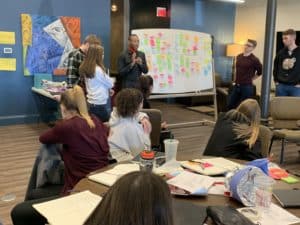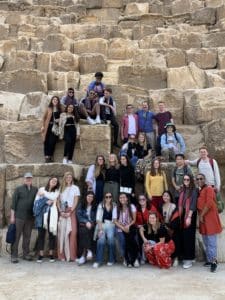How do we solve the world’s most pressing problems? And what is possible when we leverage the inexhaustible applications of creativity toward developing a life of means, meaning, and the chance to give back?

Driven by the belief that universities must equip the next generation to make the world a better place, DePauw University launched a new Winter Term course in January 2020. Embracing this vision, Leading Change: A Design-Thinking Challenge in Cairo, Egypt hosted by The American University in Cairo. The course had three goals:
- Fostering creativity, sparking an entrepreneurial-mindset, and introducing the Design-Thinking method;
- Engaging with local Cairo scholars and exploring iconic sights, including The Great Pyramids of Giza, Sphinx, Egyptian Museum, Market in Old Cairo, Hanging Church, Mosque of Muhammad Ali, and more, students were immersed in Egyptian culture, politics, religion and more during their 2-week stay on the campus of Global Liberal Arts Alliance partner institution, American University in Cairo;
- Opening-up a world of possibilities, students studied innovations and interacted with innovators committed to tackling some of the world’s most complex problems as defined by the United Nations Sustainable Development Goals.

The course challenged students to grow empathy for others who experience a life very different than their own; define problems; imagine a world of solutions; fuel their entrepreneurial spirit; and invent the future they hope to inherit, all in service of their local challenge:
How might we take inspiration from Cairo’s approach to sustainability to improve sustainability on DePauw’s campus?
The design-thinking process involves five stages: empathize, define, ideate, prototype, and test. From their work in Cairo, the students produced five podcasts and one short film that speak to this challenge.
While Fast Fashion sets out to investigate issues of responsible consumption and production within the global clothing industry, student-producers discover inspiration in an unlikely place – Cairo’s community of “trash pickers” and the women of Zabbaleen.
Authors: Sarah Congress, Sarah Ramsey, Autumn McDaniel, Evan Grathwohl, Michelle Figueroa
Brain Drain looks to SEKEM, a desert farm 50 Kilometers outside Cairo’s city limits, as a model for addressing the UN’s commitment to eradicating world hunger and the challenges of retaining top talent to help grow local economies.
Authors: Natalie Michaels, Kimyen Le, Ryan Jones, Leah Smith
The student-producers of Keeping Her Around explore the complexities of gender equality in the Arab nation of Egypt and on their home campus of DePauw University.
Authors: Eduardo Garcia, Abigail Hess, Colleen Janes, Jazmine Kerr
Believing that all children deserve the opportunity to obtain a quality education as a path for improving their lives, Access investigates the parallels between public education in Cairo, Egypt and Greencastle, Indiana USA and offers, even if only in part, a local solution to accomplish this goal.
Authors: Reza Slivka, Jack Hallier, Emma Kennedy, Giselle Villegas
In Building the Bridge, student-producers argue that both AUC and DePauw University have more to learn if they are to build open, honest, transparent, sustainable communities and close the trust-gap between students and administration.
Authors: Gretchen Bechthold, Jacob Correa, Meghan Wallace, Kagna Hou, Patrick McNamara
In this short film, Building Sustainability explores Egypt’s modern and historical architecture as a window to better understand how DePauw can become a more sustainable community.
Authors: Meredith Breda, Grace Evans, Ian Brundige, Edward Kim, Peter Nicieja
Support for this project was provided by the Great Lakes Colleges Association as part of its Global Crossroads Initiative, made possible by a grant from the Andrew W. Mellon Foundation.

